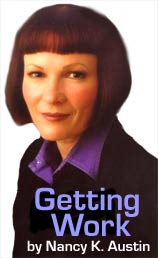 |
|
||||||||||||
|
Columns by Nancy K. Austin: Everyone's a Critic... Even You
List all of Nancy's columns
Visit our other Getting Work Columnist
|
In my life, there have been three: (1) my first boss, who handed me hard-hitting assignments that honed my skill and built my confidence; (2) a veteran executive in a high-tech company, who showed me what I needed to learn; and (3) a brilliant editor, who showcased what I knew. They have all been mentors of mine, which is to say the gift of their wise counsel has helped me wrangle with ethical dilemmas, plow through backbreaking projects without going bonkers, and understand the difference between tough-minded and cocksure. They've also opened certain doors for me -- doors I couldn't have crowbarred on my own -- by dropping my name at a crucial moment, or by introducing me to honchos who were, not accidentally, in the market for my kind of talent. What about you? Are you jonesing for a mentor of your own -- somebody who puts you in touch with the right people at the right time? A professional friend who shows you the ropes, keeps you out of trouble, and (let's not forget) begets new business? Want to know how to find yourself such a valuable counselor, and what you should do once you've got one? Well, keep reading, Bucko. There's no place like home. Now, before you gallop off into the setting sun to lasso that magical mentor of your dreams, get a grip. Think first about the people right under your nose: You probably don't need to ramble all that far to find a top-notch group of potential gurus. This ready bunch may include former bosses, teachers, and colleagues; friends, accomplices, and allies; family members; people who have encouraged you; even people with whom you endured something really brutal -- a client from hell, writing your first proposal -- because trying times connect you for good. Anyone from this group is your first line of defense, your built-in support team. And since they already know you, there's no earthly reason to be shy about approaching any of them. Come to think of it, that's the great thing about this merry band. They're the ones who are most likely to mention your name anyway, because they think the world of you. And without prodding or promoting or persuading, you'll find that they are perfectly willing to put themselves on the line to prove their good judgment and superior taste. If you're worried about developing a reputation as a flamboyant favor-monger-about-town, don't be. You're forgetting a basic tenet of human psychology -- that people who are asked to provide guidance are happy (okay, they're over the moon) to do it. Who wouldn't want to be regarded as a learned advisor? Consider what a colleague of mine, a college professor, told me. When he has students profile a high-ranking executive in an industry they'd like to go into, he says they're convinced that no one so exalted would take the time to talk to them. "But the majority of people will, and do -- if you're respectful of their time and you've done some homework about them and what you want to talk to them about -- since they remember what it was like when they were looking for guidance," he says. "The trick is to remember this, and to be willing to serve as a mentor to others coming up behind you." It's worth mentioning that to mentor someone doesn't mean you must be best buds forever. In her new book, Thriving in 24/7, author Sally Helgesen talks about the importance of drawing on "weak ties," calling on people you know only slightly and asking for advice or information. By maintaining a range of connections, you broaden your choice of mentor talent so that you aren't limited to your old school chums, two favorite clients, and three vendors. The more mentors, the merrier. Instead of searching for the one true mentor who will rock your world, think bigger. Why not marshal a group of people to act as collective mentors, like an informal board of directors? That's an especially powerful idea for IPs -- people who are always on their own, doing different things and zigzagging through different worlds -- since it's almost impossible to find the one mentor who has pursued exactly the same path and who's equipped to steer you through your whole magical mystery tour. But you certainly should think seriously about recruiting a group of mentors to fulfill that role in your life. My college-professor colleague says he's always relied on a posse of people to advise and guide him. His go-to group is actually made up of three sub-groups: People who "act as sounding boards for ideas [he's] trying to wrestle to the ground," a couple of writers who help him stay on track with his own writing, and three or four teachers with whom he exchanges notes and suggestions for keeping his classes chugging along. "I've kind of hand-picked people over time, to see how it works out," he says. "And I've never called this informal group a 'board,' not because there's anything wrong with that, just because it hasn't seemed necessary." Some IPs, however, go so far as to launch the equivalent of mentor membership drives, dangling incentives and gifts for the most useful contact or idea contributed by a prospective member. Top ten idea-generators get to be mentors! Just please promise me you won't do anything that dumb. For structure-freaks, you might try sending board members printed invitations to a big get-together, or throwing carefully planned dinners maybe twice a year, complete with a formal agenda for the evening. It's not everybody's cup of tea (including mine). My professor pal would never formalize the process: "[That] would put a damper on one of the things that makes it work so well -- the openness of the relationships. That's one of the great characteristics of the informal working relationship: A lot of give and take and reliance on each other's skills and networks." Stifle the yackety-yak. Don't assemble an informal board only to load it up with people who give you "an excuse for you to yak away, rather than work," my colleague advises. "There's a tendency among IPs to use tactics that seem like productive efforts," he says. "But in the end they turn out to be stalling tactics." He's right; my friend Greg, a director in Hollywood, calls it "sharpening pencils." The behavior looks so innocent, so industrious that you can hardly criticize it -- but it's really just a strategy to stay away from the real work looming ahead. To avoid the hypnotic pull of just sharpening pencils when you've got real work to do, be clear about the type of help you need from your prospective mentor. Sort it out: Are you having a problem getting clients to pay you on time, or are you losing contracts to the competition because they're undercutting you or offering more services? Is there a big opportunity out there that you'd like to jump on, but you don't know where to start? Or are you facing a dilemma, perhaps a choice between hooking up with two very different clients? Only when you've put your questions through these fundamental filters (and maybe more), should you take a crack at explaining to your advisors the kind of assistance you're looking for. It's worth the trouble: You won't waste their time, and you'll get high-caliber advice. Mentors, like valentines, cannot be driven -- only attracted. If you're good at what you do, if learning turns you on, if you're willing to take the time to look people up and welcome them into your network, you've got what it takes to attract a mentor -- somebody smart who's drawn to you because you're drawn to them. |
||
|
Illustration by Bill Ross. We'd love to hear your feedback about this column, or put you in touch with Nancy K. Austin if you like. You may also like to see her biography. |
The 1099 name and logo are trademarks of 1099 Magazine.


